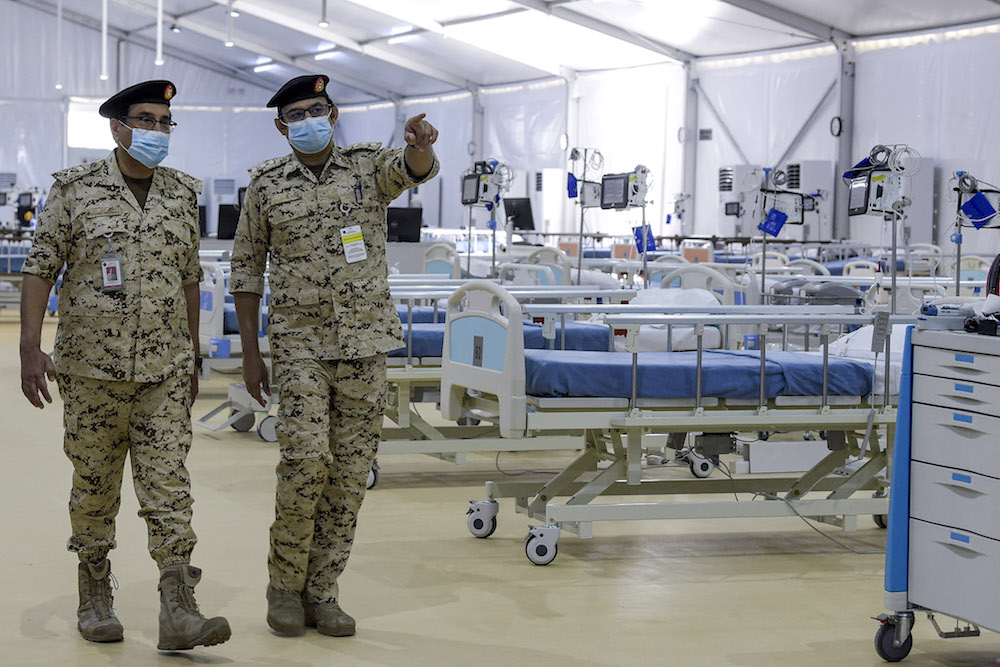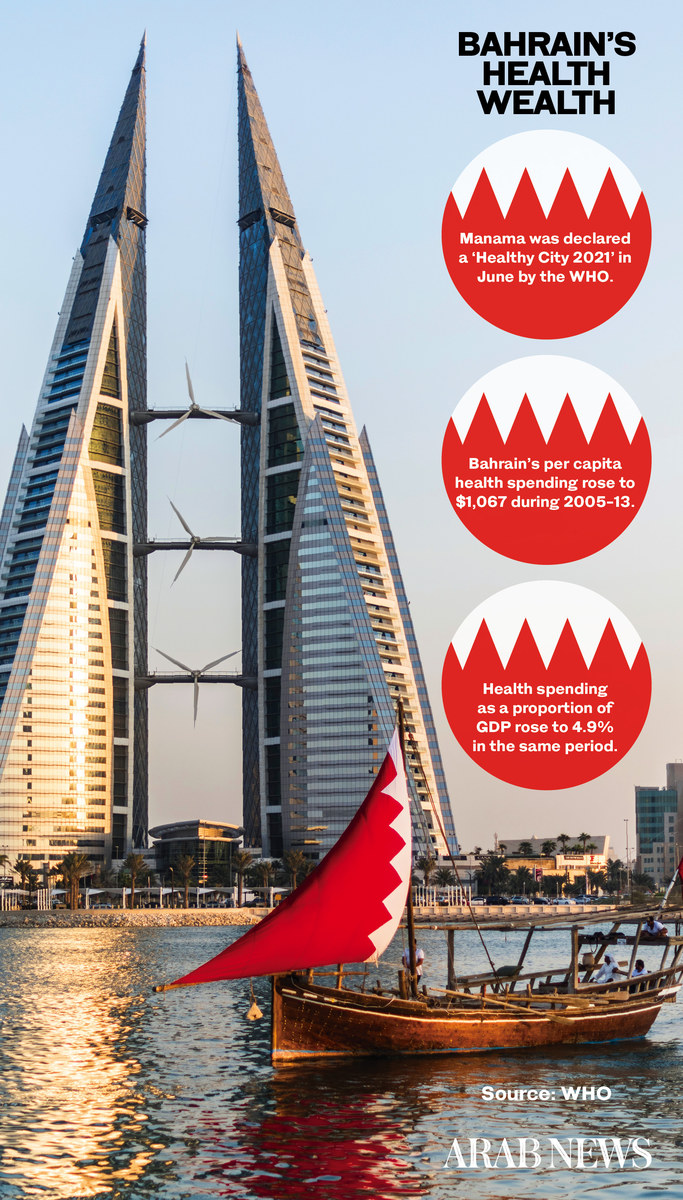DUBAI: Bahrain, where Arabian Gulf oil was first discovered, where its first electrical infrastructure was installed, and where its first school for girls was established, has chalked up yet another regional first.
Manama, the island kingdom’s capital, has been labeled a “Healthy City 2021” by the World Health Organization (WHO) — the first Middle East capital to earn the distinction — in recognition of its commitment to creating an environment conducive to human well-being.
“This is a great honor for us,” Sheikh Hisham bin Abdul Rahman Al-Khalifa, the governor of Manama, told Arab News. “We are very happy that we made it and Manama was recognized as the first city in the region as a healthy city.”

Governor of Manama Sheikh Hesham bin Abdulrahman Al-Khalifa. (Supplied)
A “Healthy City,” the WHO says, is defined by a process. It is a city that is conscious of health and is striving to improve it; any city, regardless of its current health status, has the potential to become one.
“A ‘Healthy City’ is one that continually creates and improves its physical and social environments and expands the community resources that enable people to mutually support each other in performing all the functions of life, and developing to their maximum potential,” the WHO explained.
The “Healthy City” concept was launched in 1990 to establish a link between the services provided to citizens and the implementation of sustainable development policies.
The approach seeks to put health high on the political and social agenda of cities, and to build a strong movement for public health at a local level. It strongly emphasizes equity, participatory governance, solidarity, collaboration and action to address the determinants of health.
Successful implementation requires innovation addressing all aspects of living conditions, and extensive networking between cities.

Bahraini policemen seal off a building housing foreign workers in the Salmabad industrial area as a precautionary measure after a resident tested positive for coronavirus (COVID-19). (AFP/File Photo)
Bahrain joined the WHO Healthy Cities Network in 2015 and initially launched a pilot scheme in the Umm Al-Hassam district of southern Manama. After this won WHO approval in 2018, the kingdom expanded its projects to cover the entire capital, forming a special council to oversee its implementation.
Manama was declared a “Healthy City” in June during a virtual ceremony hosted by the WHO Regional Office for the Eastern Mediterranean.
Like the rest of the world, Bahrain has been hit by coronavirus-induced lockdowns, uncertainty and economic disruption. But now, more than 18 months since the coronavirus disease (COVID-19) emerged in China and engulfed nearly every country on the planet, Bahrain appears to have turned the corner. It is currently behind only the UAE and Malta in terms of vaccine doses administered per capita.
Rapid urbanization worldwide has made the concept of healthy cities all the more pertinent. Cities are frequently overcrowded with inadequate means of waste disposal, polluted air, street violence and, in many cases, substandard housing and hazardous working conditions.
In 2018, some 55 percent of the global population lived in cities, according to UN figures. That percentage is forecast to grow to 68 percent by 2050.

Bahraini security forces members tour the Sitra field Intensive Care Unit (ICU) hospital for COVID-19 patients in Sitra island south of the capital Manama on May 4, 2020. (AFP/File Photo)
Rising urbanization requires “successful management of urban growth” and better handling of issues relating to housing, transportation and energy, coupled with basic services such as education and healthcare, says the UN Department of Economic and Social Affairs.
Today, the majority of Bahrainis live in towns and cities, while an estimated 11.4 percent of the kingdom’s population live in rural areas, according to a 2015 profile published by the WHO in 2017.
Based on several metrics for health and well-being, the kingdom is performing well. Life expectancy at birth now averages 77 years; the literacy rate is 98.2 percent for young people and 94.6 percent for adults.
In a country of 1.641 million people, with a capital city housing 200,000, the health workforce density is 9.1 physicians and 24.1 nurses and midwives per 10,000 people, according to UN figures.
FASTFACTS
* Manama was declared a “Healthy City 2021” in June by the WHO.
* Bahrain’s per capita health spending rose to $1,067 during 2005-13.
* Health spending as a proportion of GDP rose to 4.9% in the same period.
(Source: WHO)
Bahrain’s main environmental risk factors include “air pollution, chemical exposure, housing and environmental determinants of injuries” which “contribute significantly to the burden of noncommunicable diseases and injuries,” according to the WHO.
To qualify as part of the Healthy Cities Network, a city must have a clean, safe physical environment, including good quality housing, an ecosystem that is stable and sustainable in the long term, a strong, mutually supportive and non-exploitative community, and a high degree of participation by citizens over the decisions affecting their lives.
The basic needs of food, water, shelter, safety and work with income must be available to all residents, who must also have access to a wide variety of experiences and resources, including the chance for interaction and communication with others.
Qualifying cities must also have a diverse, vital and innovative economy, along with connectedness to their pasts, accommodating the cultural and biological heritage of city dwellers with others.
It must also have an optimum level of appropriate medical services, accessible to all, and good general health.

Bahrain’s Health Minister Faeqa bint Said Al-Saleh (R) and Capital Governor Sheikh Hesham bin Abdulrahman Al-Khalifa (L). (Supplied)
In a recent interview with Arab News, Dr. Waleed Al-Manea, Bahrain’s undersecretary of the Ministry of Health, said: “Since the start (of the pandemic), we have adopted a strategy of transparency — that’s been very important to us.
“With that transparency, we promised ourselves that we would work with facts rather than with deception. Whenever we have made a decision, it has been informed by facts.”
The WHO states that “the ‘Healthy Cities’ approach recognizes the determinants of health and the need to work in collaboration across public, private, voluntary and community sector organizations.

“This way of working and thinking includes involving local people in decision-making, requires political commitment and organizational and community development, and recognizes the process to be as important as the outcomes.”
Around 70 different projects have been implemented in Manama to help eliminate health risks and to spread awareness, Sheikh Hisham told Arab News.
Among them is the “Green Capital” project to increase the number of parks and public gardens, reduce carbon emissions, “encourage small and medium environmentally-friendly projects, increase awareness on environmental principles, and most importantly, include volunteers in our sustainable development projects. One of these projects was cleaning the beaches,” he added.
An initiative called “Colors, Healing and Happiness” was implemented with the cooperation of the Ministry of Health and around 60 volunteer artists. It followed a study by researchers from Bahrain University examining the effects of colors and drawing on mental health.

A Bahraini police officer instructs a foreign worker to wear his protective mask amid the COVID-19 pandemic, in the old marketplace of the capital Manama. (AFP/File Photo)
As part of a different project, an online platform called “My Capital” was initiated to facilitate better communication between residents and local government.
Yet another initiative, “You Matter,” was introduced to assist those who have suffered psychologically as a result of COVID-19, with the participation of medical specialists.
On the housing front, dozens of inspections have been made by a specialist committee to ensure safety standards are met. Any buildings that failed to meet its criteria were subject to renovations and modifications.
Sheikh Hisham said 2,627 facilities in Manama had been inspected and up to 97 percent of them were modified to ensure safety measures were put in place.
Up to 2,250 housing units in poorer neighborhoods were modified to improve health and safety standards, including the removal of informal or unauthorized electrical wiring. To reduce overcrowding in some urban districts, around 18,400 low-income workers were moved to other accommodations.
Dozens of old buildings in the industrial areas of Khalifa bin Salman Port have also undergone renovations, while measures have been imposed to ensure residential homes and areas serving food are situated at a safe and healthy distance from industrial areas.
Expressing his gratitude to the citizens of Manama for their cooperation in the city’s restoration and development, Sheikh Hisham said “the process of ‘Healthy Cities’ will continue in the future,” extending to every town and village in Bahrain.
-----------------------
Twitter: @jumanaaltamimi



























